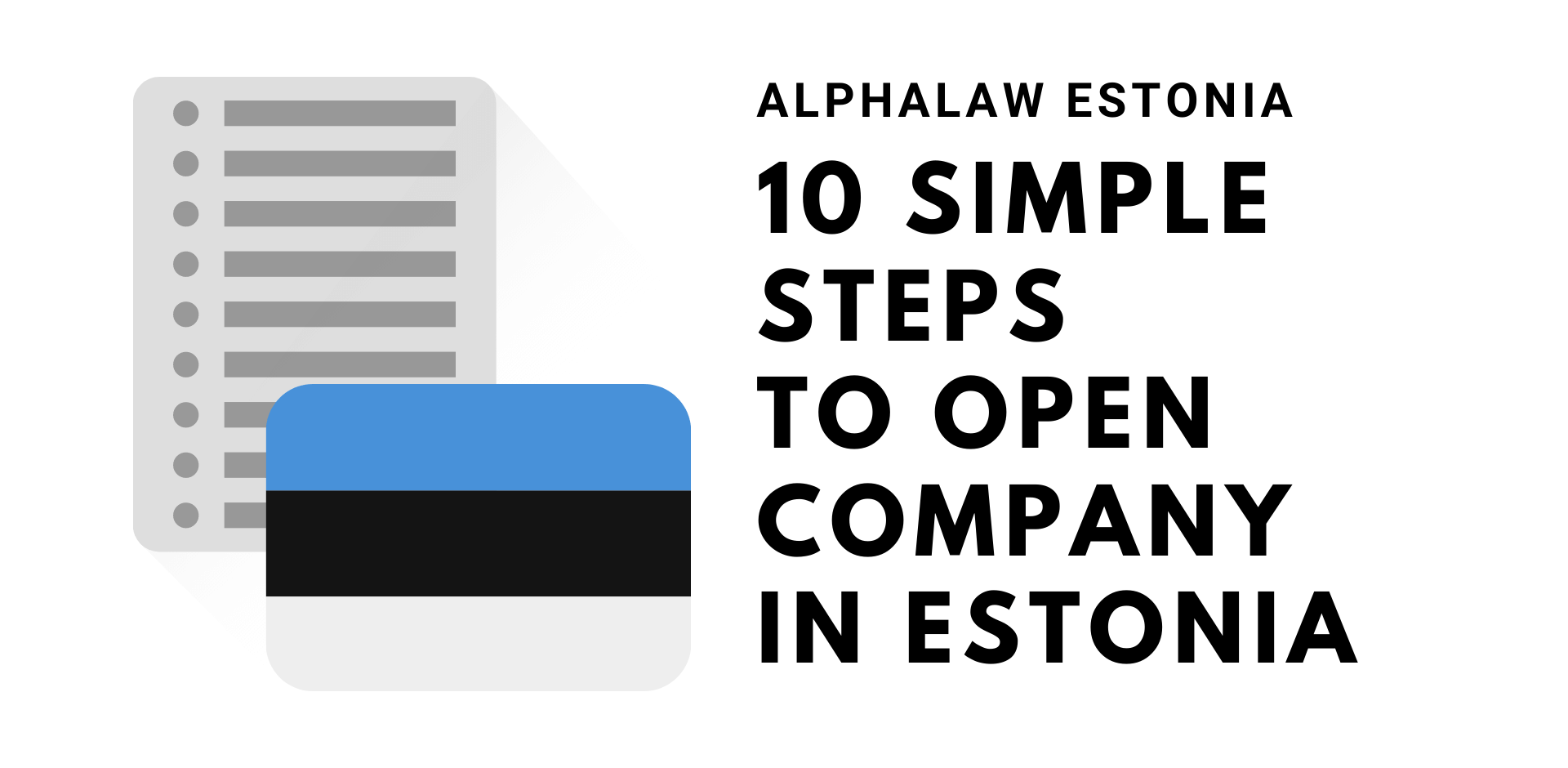10 Simple Steps to Open Company in Estonia
The process of opening a company in Estonia is quite simple and straightforward. In this article, we have tried to outline the main steps (10 simple steps) that you need to follow to open a company in Estonia.

Estonia is a very favorable country when you plan to start a business in the European Union. Convenient banking environment, electronic enterprise management, friendly attitude towards foreign businessmen and 0% income tax... all these benefits you get once you choose Estonia as a jurisdiction for your business.
Step 1. Determine the form of ownership for the new firm.
There are several types of forms in Estonia:
Limited Liability Company - OÜ
This is the most common type of company in Estonia. An OÜ company can be created by one person, he can also become a board member of a new company.
In Estonia, a foreigner can open a company, there is also no requirement for local residents to be on the board of the company.
An OÜ company must have a legal address and a contact person in Estonia.
The minimum authorized capital of the company is €2500. There are several ways to add it.
You can deposit authorized capital with money, paying a fee while filling out an application in the Commercial Registrar system.
You can open a company without paying the authorized capital. However, before paying dividends or selling the company, the capital will need to be paid.
In Estonia, there is a form of payment for the authorized capital in the form of a property contribution. The owner of the company transfers into the ownership of the company his property in the amount of €2,500.
The firm is liable for its obligations within the framework of its authorized capital. A member of the board is responsible for all actions of the company.
According to the standard charter, which is proposed in the system of the Commercial Registrar, the authorized capital of a company can be increased by 4 times without changing the charter. If this is not enough, a new charter of the company must be adopted.
Individual entrepreneur - FIE
No start-up capital is required to create an FIE. However, an individual entrepreneur is liable for his obligations with all his property. There is an obligation to pay 33% of social tax on the total amount of income received. There is a system of advance payments with the obligation to pay once a quarter.
Joint-stock company - AS
A public limited company in Estonia must have at least 1 shareholder. The minimum authorized capital of a joint stock company is €25,000. The governing bodies of the company are the General Meeting of Shareholders, the Management Board, and the joint-stock company must also have a Council consisting of at least 3 members.
Shares must be registered in the register of securities. A joint stock company can list shares on the stock exchange.
There are also such forms of company as Limited Partnership and Commercial Association. These forms are very rarely used when doing business in Estonia.
Step 2. Choose the name of the company.
There is a phonetic match system in Estonia. Therefore, before proceeding with the registration of a company, you need to have 5-6 variants of spare names.
Step 3. Get acquainted with the tax requirements and tax rates in Estonia.
In general, the following taxes apply in Estonia:
If the company has employees: Income tax – 20%, Social tax – 33%. Unemployment insurance 0.8% + 1.6%.
If the only source of income of an Estonian resident is an income earned as a board member, a mandatory social tax arises. This rule does not apply to non-residents.
If the taxable turnover of a company in Estonia exceeds 40 thousand euros (per year), the company must obtain a VAT number and pay VAT (VAT rate corresponds to 20% for most of products and services).
When the company has a profit, and it was decided to pay it as dividends, a dividend tax 20/80 arises (from the first payments, then a reduced tax rate applies).
Retained earnings tax – 0%.
Step 4. Become familiar with the accounting requirements.
Accounting is an important part of a firm's business. All companies and branches of foreign companies operating in Estonia must keep accounting records. The accounting of each company must comply with the standards set by the state.
- All economic transactions must be documented.
- All economic transactions must be kept in books and journals (including in electronic form).
- Each company must prepare and submit an annual report to the Commercial Register.
- All accounting documents must be archived.
Step 5. Choose the field of activity of the company.
It is necessary to select the activity of the company based on EMTAK codes. When opening a company, one main type of activity is indicated. However, the company can engage in any activity permitted by law. Information about this is submitted upon submission of the annual report.
Step 6. Choose a way to create a company.
Create a company online through the commercial register system. Requires an ID card or e-residence
The company is created with a standard set of documents without the possibility of amending the charter. With electronic registration, it is possible to pay the authorized capital only in cash, or create a company without making the authorized capital.
Create a company with a notary
To do this, you need to book a time with a notary and prepare a package of documents, with the exception of the charter and articles of association.
It is possible to create a company with a notary by power of attorney (it must be translated into Estonian by a notary).
Step 7. Pay the state fee.
The amount of fee depends on the form of the legal entity. After paying the fee, the Commercial Register proceeds to check the submitted documents, and if everything is in order, in 1-5 days the company is ready to work.
Step 8. Open a current account of the company in one of the banks in Estonia or in online banks (payment systems).
The most popular banks in Estonia are AS LHV pank, SEB Pank AS and Swedbank AS. Banks provide convenient Internet banking. It is also possible to obtain loans and lease. Leasing programs also exist for non-residents of Estonia.

Step 9. Conclude an electronic document management agreement with the Estonian Tax and Customs Board.
An Estonian company must file returns with the tax department, even if the activity is not yet in progress. The convenient electronic system of the tax department allows to do this quickly and easily. It is also possible to check the presence or absence of tax payment requirements at any time, as well as at any time it is possible to view the entire history of submitted returns and paid taxes.
Step 10. Check whether it is necessary to obtain additional permits to conduct business in Estonia.
Information on the required permits, as well as the conditions for submitting an application, is available on the website of the Register of Economic Activities (MTR) of Estonia.
The specialists of AlphaLAW company will be happy to assist you in registering a new company in Estonia or purchasing a ready-made company. We provide a full range of business services in Estonia: tax consulting, licensing, registering & supporting of small funds, financial & crypto companies formation, IBAN and SWIFT accounts opening for companies and personal use.






